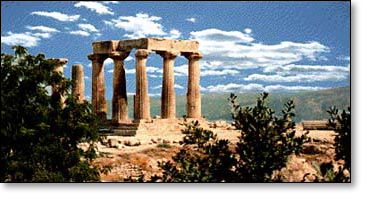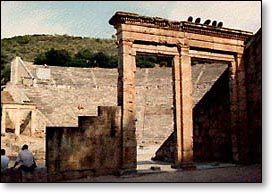Europa (yoo-ROH-pa). Phoenician princess abducted to Crete by Zeus. Europa was gathering wildflowers in a seaside meadow when she came upon a beautiful white bull. This bull was uncommonly gentle and did not inspire fear. Decking its horns with flowers, Europa was at length emboldened to climb upon its back. Whereupon the bull - actually the god Zeus in disguise - took off at a trot and dove into the sea. Europa was carried off to the island of Crete, where she became the mother of King Minos.
 Europa's brother Cadmus was charged with the duty of finding his sister and securing her return. He consulted the Oracle of Delphi, however, and was told to abandon the search. Instead he was to venture forth until he should meet a cow, to follow this cow wherever it should lead and to found a city upon the spot where it lay down. Such is the foundation legend of the Greek city of Thebes, which goes on to relate how Cadmus and his companions went out to fetch water for their new settlement at a nearby fountain.
Europa's brother Cadmus was charged with the duty of finding his sister and securing her return. He consulted the Oracle of Delphi, however, and was told to abandon the search. Instead he was to venture forth until he should meet a cow, to follow this cow wherever it should lead and to found a city upon the spot where it lay down. Such is the foundation legend of the Greek city of Thebes, which goes on to relate how Cadmus and his companions went out to fetch water for their new settlement at a nearby fountain.
 Here all but Cadmus were slain by a dragon. Cadmus killed the dragon and, at the prompting of the goddess Athena, sowed some of its teeth in the ground. Armed men sprang up from the earth, just as they later would for Jason under similar circumstances - for the teeth that Jason strew upon the fertile soil of distant Colchis came from the very dragon that Cadmus had killed. Using the same trick that would eventually serve Jason, Cadmus caused the sown men to fight amongst themselves until only five were left standing. These five, together with Cadmus, became the original inhabitants of Thebes. Cadmus, their king, is said to have taught them the alphabet and the art of writing. Indeed, the Greek alphabet historically derives from the land of the Phoenicians (in the region of modern Syria, Lebanon and Israel), mythological home of Cadmus and his sister.
Here all but Cadmus were slain by a dragon. Cadmus killed the dragon and, at the prompting of the goddess Athena, sowed some of its teeth in the ground. Armed men sprang up from the earth, just as they later would for Jason under similar circumstances - for the teeth that Jason strew upon the fertile soil of distant Colchis came from the very dragon that Cadmus had killed. Using the same trick that would eventually serve Jason, Cadmus caused the sown men to fight amongst themselves until only five were left standing. These five, together with Cadmus, became the original inhabitants of Thebes. Cadmus, their king, is said to have taught them the alphabet and the art of writing. Indeed, the Greek alphabet historically derives from the land of the Phoenicians (in the region of modern Syria, Lebanon and Israel), mythological home of Cadmus and his sister.
|
| Eurydice (yoo-RID-i-see). Nymph, wife of Orpheus. Eurydice stepped on a poisonous snake and died while running away from the minor deity Aristaeus. Her husband was so disconsolate that he journeyed to the Underworld and asked permission of its rulers to bring her back. This was granted, on the condition that he not look at Eurydice while leading her toward the land of the living. They were almost to safety when he forgot and looked back.
|
| | Eurystheus (yoo-RISS-thyoos). Cousin of Heracles who assigned him his Labors. King of Mycenae and Tiryns only because of Hera's hatred of Heracles, who was the son of her husband Zeus and the mortal Alcmene. Knowing that Alcmene was about to give birth, Zeus had bragged that one of his descendants was about to be born who would rule over two great kingdoms. Hera tricked him into swearing to this, then retarded Alcmene's delivery. Eurystheus, Zeus's great-grandson, was born first.
| | |





